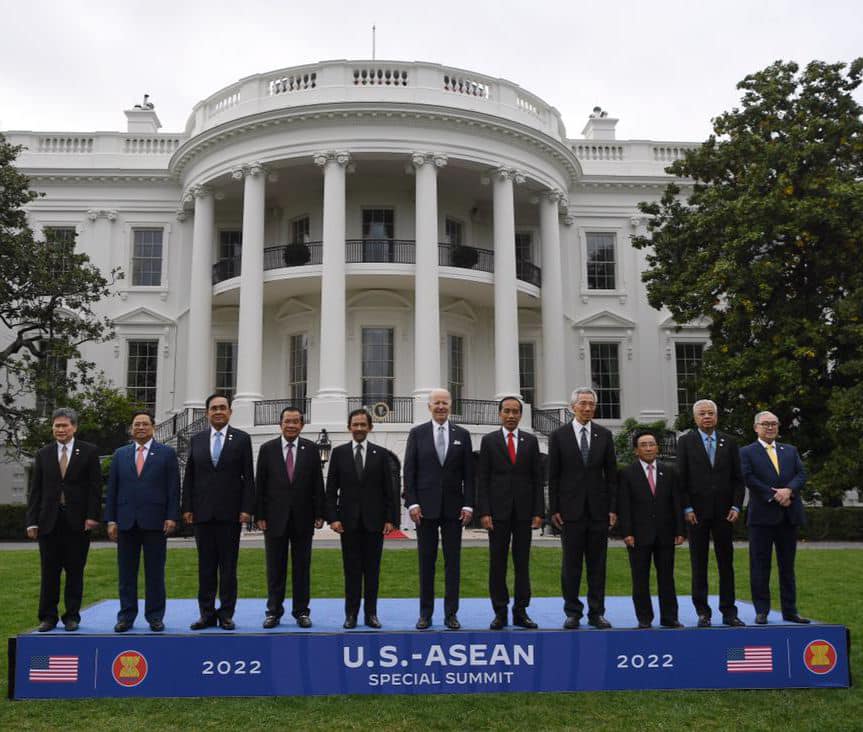
By Manik Mehta
WASHINGTON DC, May 14 – The United States, responding to the oft-heard complaint of its partners and friends, particularly in the Indo-Pacific, that it had apparently abandoned its traditional leadership role, reinforced in several high-profiled meetings between top representatives of the Biden administration and leaders the 10 member ASEAN group on the second day (Friday) of the US-ASEAN special summit in Washington DC.
Secretary of State Anthony Blinken, who practically reiterated this commitment in every meeting he held with his ASEAN counterparts, including a joint appearance before journalists with his counterpart from Cambodia which presides the ASEAN group this year.
US Vice President Kamala Harris at a working lunch hosted for the leaders of the 10 ASEAN leaders – the leaders of Myanmar and the Philippines did not attend the summit – as she described the importance of the summit as a “signal to the world of the strength of the United States-ASEAN partnership”.
Calling Southeast Asia a “priority for our entire administration”, Harris said that both sides had priorities in common. Some of the issues discussed included global health and maritime security, climate, clean energy and infrastructure. She said her visit to Singapore and Vietnam last year was aimed “to demonstrate our commitment to Southeast Asia and to strengthen our partnerships in the region”, adding that she remained personally “very focused” on deepening US ties with ASEAN.
Apparently with an eye on China, she said that the Biden administration recognized the vital strategic importance of the region, a role that would only grow with time, and acknowledged ASEAN’s centrality in the region’s architecture. Referring to the US as an “Indo-Pacific nation”, she said that the US will be present and continue to be engaged in Southeast Asia for generations to come.
“On the issue of prosperity, resilient supply chains in Southeast Asia benefit American consumers. When global supply chains are flowing, more goods are available and prices, of course, come down,” she said, adding that Southeast Asia is the fourth-largest market for American goods and supports more than 600,000 American jobs.
During her Singapore visit, she had called at the Changi Naval Base to meet American sailors at the USS Tulsa. “Their presence is a demonstration of our work with our allies and our partners to ensure free and open shipping lanes and to defend the international rules-based order,” she said.
The US which has been closely monitoring – and also discussing with ASEAN partners – China’s activities in the region will “guard against threats to international rules and norms”. Indeed, maritime security was discussed at the lunch meeting. She told her guests that the US would provide US$60 million in new regional maritime initiatives led by the US coast guard.
According to Harris, the US will deploy to Southeast Asia a new cutter as a training platform. And would also send additional personnel, including technical experts, to the region.
Touching on the COVID-19 assistance, she also said that the US, which had done a lot together in the past two years, donated more than 115 million vaccines to ASEAN members without conditions.
“We will continue to work with all of you to save lives with vaccines, with testing, and with therapeutic,” she said.
There has been talk for some time about the Indo-Pacific Economic Framework which President Biden will discuss in Japan and South Korea during his visit to both countries next week. The ASEAN grouping is also interested in the IPEF; Indonesian foreign minister Betno Marsudi said she hoped “to see synergy between the Indo-Pacific Economic Framework with the implementation of cooperation under the ASEAN Outlook on the Indo-Pacific”.
When this correspondent queried an Indonesian official how the US felt about the presence of Russian President Vladimir Putin at the G-20 summit in July to be hosted by Indonesia – Jakarta has invited Putin to attend the summit – the official quoted Marsudi as saying she hoped “the war in Ukraine would end as soon as possible”. However, Indonesia has said, as a compromise, it would also welcome Ukrainian President Volodymyr Zelensky.
Later in the day, President Biden described the summit as the dawn of a “new era” in the relationship between the US and the ASEAN bloc. Biden will nominate soon Yohannes Abraham as the US ambassador for ASEAN, and work towards elevating the critical partnership with ASEAN.
The US is keen to foster closer strategic ties with the region’s heavyweights Indonesia and Vietnam. Indonesia, aware of the Russia-friendly ties maintained by Laos, Myanmar and Vietnam, expressed in general terms the hope that the Ukraine war would end as soon as possible. Indeed, Indonesian President Joko Widodo had earlier pointed out that the Ukraine war was impacting the global economy, causing sharp food and energy price increases.
Myanmar’s human rights’ situation was also discussed at length and Blinken said that the US was working very closely with its partners on Myanmar. Blinken discussed this question with Cambodian foreign minister Prak Sokhonn who also serves as ASEAN’s special envoy to Myanmar.
Myanmar’s junta chief, Senior Gen. Min Aung Hlaing was barred from the summit following that country’s human rights violations. The Philippines was represented by its foreign minister as it wraps up a presidential election this week.
Malaysian Foreign Minister Saifuddin Abdullah called out Myanmar junta officials in a series of tweets for failing to honour their commitment to end violence in the country, while US Deputy Secretary of State Wendy Sherman held a meeting with Zin Mar Aung, the foreign minister of Myanmar’s shadow National Unity Government. Sherman said that the US would continue to work closely with ASEAN and other partners in pressing for a just and peaceful resolution to the crisis in Burma (the US uses the old moniker for Myanmar), State Department spokesman Ned Price said in a statement.
–WE